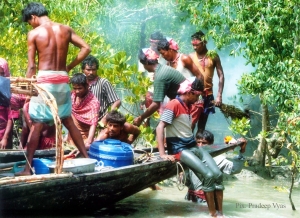MFF’s resilience approach goes mainstream
Pakistan adopts the MFF Resilience Analysis Platform for coastal planning
Location: Asia Region. 12th Dec 2013
The framework provides a tool, the MFF Resilience Analysis Platform (RAP) for structured analysis of the target communities taking into consideration both the social and ecological system. By using the RAP tool it is possible to get a detailed understanding of the gaps in resilience in the two systems which needs to be addressed. This 'resilience map' will allow MFF to provide a more strategic support and in addition will provide the countries with valuable information for development of their national coastal development policies.
The MFF Resilience Analysis Platform was piloted, tested in Shyamnagar, Bangladesh and MFF is now taking steps through a Training of Trainers approach to mainstream the approach into the national programme of all its member countries.
The first Training of Trainers workshop to mainstream MFF's resilience approach was held in Karachi, Pakistan on October 7, 2013 (see related story). The participants were introduced to the four steps of the Resilience Analysis Platform, that are used to map the resilience parameters at a project site. The first step establishes the socio-ecological history of the site (“looking back”); the second step generates a view of the present by generating a “General Systems Model” of a site’s social and ecological systems. This step includes a validation process between community members and scientific experts. The third step envisions future scenarios of a project site (“looking forward”), while the fourth step formulates strategies to develop a resilient community. The fifth step makes the four steps practical, by identifying grant funding priorities.
The Bangladesh Shyamnagar case study was used to demonstrate these five steps. “The case study provided new avenues in shaping my view of project management,” shared participant Mr Noor Ahmad Samoo, Additional Secretary of the Balochistan Fisheries Department. “At first, my limited understanding of resilience was a challenge. But after the group discussions, I understood how social and ecological systems complement each other, and how both contribute to community resilience.” According to the Bangladesh experience, field-based analysis is crucial to applying MFF’s resilience approach. Pakistan took this learning to heart. “Learning how to appreciate a site’s history, using a ‘backward timeline’, is very useful when planning project strategies,” added Mr Samoo.
“Resilience is still a developing science, and the Resilience Approach is very much needed in disaster-prone countries like Pakistan, as it deals with building capacities of local communities to cope with the impacts of climate change and other disasters,” said Mr Malik Aslam, IUCN Global Vice President, to participants of the workshop. Representatives from national and provincial agencies (such as the Balochistan Fisheries Department); national and local NGOs; and the private sector (Tourism Promotion Services Pakistan, Ltd) attended.
MFF’s resilience approach emphasizes the importance of the participatory process, and participants acknowledged the importance of having direct involvement with community members of project sites. “When I worked as a coastal district Deputy Commissioner, I had firsthand knowledge of resolving community issues in Sonmiani lagoon. Having this direct insight helped me identify and understand the drivers of change in the case study,” Mr Samoo said. This sentiment was echoed by Mr Enamul Siddique, a member of the MFF project team who spoke at the workshop about Bangladesh’s experience in applying the Resilience Analysis Platform in Shyamnagar. “The MFF resilience approach offers a ‘bottom-up’ process to coastal planning. Through this process, communities have a direct say in planning solutions to local problems, while collaborating with local governments,” Mr Siddique remarked.
As a final note on the value of this cross-country learning, Mr Raquibul Amin, Project Manager, MFF Secretariat, concluded, “MFF’s resilience approach will be implemented in all MFF countries and used to develop a better understanding of issues and problems in target areas, especially before making a call for proposals to MFF Grants Facilities. In this way, the Resilience Analysis Platform will become an important tool for a more strategic delivery of the MFF programme at both national and regional level, and will facilitate the continued efforts towards building coastal community resilience and better lives for the people living there."

Honey Colletors team in Sundarbans, West Bengal, India © Pradeep Vyas, 2007